Tag: IDEI
Listening Tour: An Interview with Nick Sailor ’17
by Joshua Lopes on April 22, 2021
Friar Sports
PC Administrator Talks Social Change in Sports
By Jack Belanger ’21
Sports Co-Editor
This article is part of The Cowl’s Listening Tour, a series that aims to amplify the voices of BIPOC members of our community and bring awareness to social justice initiatives on campus.
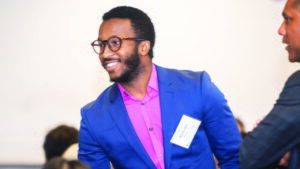
Three years ago, Fox News commentator Laura Ingraham infamously said, “Shut up and dribble” on her TV program in response to criticisms made by NBA star Lebron James of former president Donald Trump. Ingraham argued it was unwise to take political advice from someone who gets “paid $100 million a year to bounce a ball.”
Fast forward to now and countless professional athletes across the country are using their platforms to speak out against issues plaguing our society and to make change. Where at one point socially active athletes stood out like a sore thumb, today’s environment has opened the doors for all athletes to have a voice, even providing young college athletes with the opportunity to make changes in their own communities.
At Providence College, the athletic department has become a leader in pushing for change and promoting conversations about diversity, equity, and inclusion. Thanks to much of the work of director of training and education for DEI, Nick Sailor ’17, a former PC athlete himself, being an athlete at the College has come to mean more than excellence in the gym and in the classroom.
“Student-athletes are starting to recognize they do have influence and they do have a voice,” said Sailor. “They don’t have to wait on someone else to do something. They recognize they can be advocates for change.”
Ever since Sailor came back to PC 18 months ago, he has worked to create a space where everyone in the athletic department can be part of an inclusive environment. What separates PC’s athletic department from other schools, Sailor believes, is the support and participation from the senior staff, starting with athletic director Bob Driscoll, to make diversity, equity, and inclusion a priority.
“We are really fortunate we have someone like Bob Driscoll who is passionate [about promoting DEI],” Sailor commented. “This work doesn’t happen without our senior staff.”
Sailor recalled a conversation with Driscoll during his final interview for director of training and education for DEI in which Driscoll expressed that he wanted to expand the goals of the athletic department.
“[Driscoll] says to me, ‘We have the national championships, we have built great facilities, now we need to enter this new frontier.’ He wants to be an innovator and a leader when it comes to creating these inclusive spaces on campus.” Driscoll and the rest of the senior staff have done their part to attend workshops and be a part of the growth process.
Needless to say, the staff’s work has turned into student-led action that has made a real impact. In the fall, the Student-Athlete Advisory Council worked to ensure every single student-athlete at the College registered to vote in the election, achieving 100% voter turnout for eligible athletes.
The access athletes had to vote was a major change from when Sailor, in 2016, had to take a train from campus into Boston just to get onto a bus to Connecticut in order to vote in that year’s election. Sailor notes that he would never want a student-athlete to go through what he did just to vote.
Sailor believes that the work the athletic department has done could prove to be sustainable as long as everyone remains committed to it long-term, and that includes smaller departments like marketing or even business development. While racial injustice became a hot topic during the summer, the athletic department has shifted their strategy to how they can keep pushing for change in a post-pandemic world where it does not take tragic events to grab people’s attention.
“I want us to be able to talk about these issues and take action without having to unearth deep pain. What is it that we can do long-term?”
Sailor believes that everybody in the department has a role in helping promote change, and he is passionate about helping people find their specific role. Even for those who are not experts in DEI, there are actions individuals can take to be part of the solution.
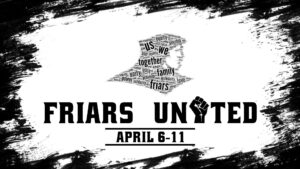
“You probably aren’t going to be up here giving an hour-long lunch and learn about intersectionality. You can make sure you have diverse candidates when hiring for [graduate assistant] positions. There are ways everyone in our department can do something to help where we are trying to go.”
More recently, SAAC created a new initiative called United Friars Week that ran from April 6-11. Each day during the week, student-athletes ran workshops that covered topics such as allyship, LGTBQ+ inclusivity, and anti-xenophobia. Athletes also wore Friars United warm-up shirts before games.
What makes college athletes especially amazing is how different the landscape is for them from just four years ago when Sailor was at school. Much of Sailor’s work now can be traced to his time as a student on campus.
“There are times I think how nice it would have been to have someone focused in DEI in an athletics role such as the one I am in now when I was a senior. Somebody that I could have looked up to as a Black student-athlete.”
Sailor’s time at PC coincided with events like Eric Garner’s death and when Colin Kaepernick began kneeling during the National Anthem. As a Black student, Sailor found Garner’s death was hard to process, and PC was still learning how to talk about events involving racial injustice. There were times Sailor felt isolated when it came to processing these kinds of events. He did point out, though, that the College is now much better equipped to talk about events involving racial injustice.
Trying to navigate through those tough conversations as a student-athlete “was definitely a tough time,” Sailor remembers. “Even then, the notion of athletes using their voice was not as commonplace as it is now.”
Looking to the future, a driving theme that Sailor envisions for student-athletes is “being bigger than the sport” and utilizing their sport for change.
“Our favorite athletes are obviously good athletes, but they have a voice bigger than their sport. Whether that is gender equity with Serena Williams, or the work Lebron James has done or Muhammed Ali. Of course, they are once-in-a-generational talents but we are drawn to them because we recognize their sport is just a part of what they are doing for a bigger cause.”
Sailor wants every student-athlete to find their voice at PC. Much like these inspirational athletes, Sailor encourages every student-athlete to help change their community for the better.
Editor’s Corner: Race in Sports
by The Cowl Editor on November 12, 2020
Friar Sports
By Cam Smith ’21
Sports Coeditor
Below is an all too brief synopsis of just one talking point from Providence College Athletics’ “Race in Sports” panel, a feature in its 2020 Diversity and Inclusion Campaign in partnership with the NCAA. The Cowl encourages you to visit the PC Athletics YouTube channel to view the full event.
PC Athletics’ “Race in Sports” panel gathered five brilliant Friar alumni for a discussion on race, sports, and the ongoing diversity efforts at the College. Moderated by Rudy Cline-Thomas ’00, founder and managing partner of Mastry, Inc., the conversation proved to be both insightful and moving.
Although many topics were covered throughout the discussion, one prevailing theme from the former athletes seemed to be their dual identities as both athletes and students. James Best ’88, former PC men’s basketball player and current Senior Advisor for the American Business Forum Inc., described how the “red-carpet treatment” that basketball players got could sometimes shelter them from a racialized campus climate.
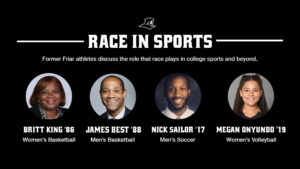
Best spoke to how it was not until he sat out a season with an injury and got more involved with on-campus organizations that he really understood and appreciated the difficulties that Black, non-athlete students faced on campus. Britt King ’86, a former PC women’s basketball star and a member of PC’s Hall of Fame, added that “on the court I had a great experience with my teammates…[but] I had friends who did not play sports, and the struggle was real.”
With this being said, the former athletes certainly still faced issues on campus because of the color of their skin. Megan Onyundo ’19, a former PC women’s volleyball star, spoke to how she constantly compared herself to the small, blonde girls on campus. Onyundo relayed how this really wore on her mental health, and how now “just realizing that and changing my mindset to I can’t be like them so I’m going to do my best based off who I am…that I’m going to be happy and proud of all the work I put in.”
Nick Sailor ’17, former men’s soccer standout and current director of training and education for Diversity, Equity, and Inclusion at PC, added further insight on this. “Like James [Best] said, you’re kind of in this bubble, yet at the same time you’re not void of those things, you’re still a young Black student on campus,” he stated. “Yes, you’re a student-athlete, yes you get the gear, yes they know who you are, but at the end of the day you’re still racialized and seen in that light. So, having to navigate those two things at one time can be challenging.”
Understanding Diversity, Equity, Inclusion, and Title VI An Interview with IDEI Assistant VP Quincy Bevely
by Kyle Burgess on October 29, 2020
Campus
By Andrea Traietti ’21
Editor-in-Chief
In just four years at Providence College, Quincy Bevely has become one of the leading voices for institutional diversity, equity, and inclusion (IDEI) in an administrative role at the College.
Since he joined PC in 2016, Bevely has served in several key positions in different departments across campus: he has held the title of assistant dean of students/director of cultural education, assistant vice president for institutional diversity, and most recently, Title VI and Title IX deputy coordinator.
It is in his newest of roles as Title VI deputy coordinator that Bevely is now responsible for PC’s compliance with Title VI requirements and for enforcing the College’s anti-harassment policy. This week, Bevely sat down with The Cowl to discuss the new Title VI projects he has been working on, and also to share his assessment of inclusivity on campus and his vision for continued progress at the College.
When Bevely formally took on the role of Title VI deputy coordinator in August, he quickly identified an area in need of immediate improvement. “I realized that there wasn’t any public forum or format for folks to submit bias reports,” said Bevely. “Additionally there was not a tool for anonymity. It allowed me to start thinking about what we could do as a college.”
So, Bevely got to work, researching other colleges’ bias response and reporting tools and putting together his own ideas for a similar reporting tool for PC. “We needed something with functionality to submit online reports, and to document and track them,” said Bevely. “The best way to do it was to create a bias response reporting tool.”
After consulting with members of the PC community from students to the College’s general counsel, PC’s new bias reporting form was released.
The form can be accessed on the Institutional Diversity page of PC’s website, and there is also a link to it on the Title VI resources tab of Student Congress’ website. It contains a series of dropdown questions for respondents to provide information regarding the incident and a space to describe the incident in detail. The form also provides an opportunity for respondents to choose to remain anonymous.
A key aspect of the reporting form that Bevely highlighted is its definition of different kinds of biases. One of the first questions the form asks respondents is, “What is the primary type of bias involved?” and provides a list of incidents to choose from, as well as an option to describe any other kind of bias not listed on the form.
Bevely said that the inclusion of this question has “given folks an understanding of how bias is defined, how it’s operationalized, and how these things adversely affect our college campus here at PC.”
The form arguably could not have come at a better time. In response to the murder of George Floyd this past May and the subsequent Black Lives Matter protests that occurred across the nation, members of the PC community saw a need to address systemic racism and interpersonal racism towards BIPOC students at PC. Students, faculty, and alumni alike began turning to the Instagram account @BlackatPC, which emerged over the summer, in order to anonymously share their experiences with racism during their time at the College and bring attention to the need for changes in administrative and academic policies.
Bevely encourages students to participate in the @BlackatPC Instagram and cited the page as something that he has been proud to see. However, he noted that the bias reporting form from the College gives him the authority to actually act on and investigate incidents of bias in a way that he cannot simply from reading through the posts on the @BlackatPC page.
“[The reporting form] gives me the authority and the power to investigate the cases because I can’t adjudicate the social media platform,” Bevely said. “Students can submit those testimonials on our documentation form and we can adjudicate it, we can investigate it, we can look into the matter further.”
In terms of the community’s reaction to the reporting form, Bevely said, “What I’ve seen is more folks submitting issues of bias because of the tool.” He noted the importance of having a method to track incidents that appear as part of a pattern, and how much easier that process has been in an online format. “If we’re seeing commonalities, if we’re seeing consistent behaviors, if we’re seeing repeat offenders, it allows us to track those things,” said Bevely.
Bevely pointed out that while the reporting form is new, the College’s anti-harassment policy has not changed in any way. However, one of Bevely’s goals was to make the College’s Title VI response and anti-harassment protocol easier for members of the community to understand. The College’s anti-harassment policy is a five-page document that outlines the detailed nature of responding to incidents of bias in compliance with Title VI regulations.
“For me reading that policy, I felt like I was learning something new everytime I read it and I can only imagine how it was for folks without a Title VI purview,” said Bevely.
To make the process of investigations more transparent and easier to understand, the Office of IDEI created visual aids for students, faculty, and staff that present the College’s Title VI response as flowcharts. The flowcharts, which outline the several courses of action the College might take depending on the kind of incident and the people involved, are also linked on PC’s Institutional Diversity webpage.
A critical method for responding to bias-related incidents on campus, the reporting tool is only one part of what must be an all-encompassing approach to inclusivity at the College, which is something that Bevely emphasized.
“I want to point out that we’re not just taking a post-vention approach, meaning responding to things as they come,” said Bevely. “We’re preventive, we’re intervening.”
“It’s important to respond, but it’s mutually important to educate as well, to prevent these issues from happening, and to help us on the road to becoming a beloved community.”
Bevely mentioned several of the key initiatives that the Office of IDEI has taken on recently as part of its educational and preventative approach to DEI work. Last year, the Office created Advocates for a Beloved Community, a student group trained to combat biases, help educate other groups on campus, and promote reconciliation and social justice.
This summer, the College launched a virtual anti-racism series. Held over Zoom, the series featured five faculty-member-led sessions, and concluded with one student-led session. Bevely also mentioned that this year, the Office of IDEI started a diversity committee to work with the Board of Trustees, which is the first committee of its kind.
Bevely emphasized that the College’s approach to inclusion and diversity is one that expands beyond the Office of IDEI. “Most folks would say either a ground-up or a top-down approach,” Bevely said. “We have neither. We have all-encompassing.”
DEI efforts at PC continue to involve different student groups, faculty members, and members of administration from across campus. Bevely stressed this point in how he conceptualizes the Office of IDEI’s role in interacting and collaborating with the College community at large: “We’re empowering them to do the work of diversity because it’s the responsibility of the entire college, not just the responsibility of our office, and we strategically set up our office in that way,” he said.
“The work that we’re doing—we’re trying to weave it into the whole entire college.”
As the Office of IDEI and the College at large moves forward with these and other initiatives to improve diversity, equity, and inclusion on campus, Bevely noted the challenge of trying to anticipate and plan for where the College might be years down the line, especially because of the uncertainty of the present moment.
When asked where he sees the trajectory of the College’s efforts five years from now, Beverly answered, “That’s a really difficult question because of where we are nationally, just given the unrest, given the political election, given the climate around campus, given the issues that the virus is creating with marginalized communities.”
Bevely said, “I hope that our office can work a little bit more with the Smithfield community. I would like to see a better relationship so as to be a resource and pillar for the community around restorative justice practices, around education, and around biases. But I think in order to branch out into the community we first have to take care of home, so I’m hoping over these next five years we can work to make PC more inclusive, increase representation for faculty of color, make it more equitable for all, make the sense of belonging for students better.”
While the long-term impact of the Office’s efforts remain to be determined by the outcome of current events, Bevely was certainly confident about one thing we are seeing right now: the momentum of the movement.
“The momentum has been unprecedented during this time, and I think the pandemic has contributed at large to that, where folks have had an ability to pause, be present, watch the news, see the things that are happening, and become more globally educated,” said Bevely. He added, “If I had to hang my hat on something that I’m very excited for, it’s that [momentum] is swinging in the right direction.”
“I feel like for the first time in the area of diversity, equity, and inclusion, we’ve captured a large ear and we’ve captured a lot of attention from the general public,” he noted. “For the first time, allyship is through the roof. You have folks asking, ‘What can I do to help?’ ‘How can I commit myself to the work of anti-racism?’ ‘How can I influence diversity, equity, and inclusion?’”
The energy of the current movement for inclusivity and diversity on campus is something Bevely remains proud of. “I’m very proud of things like the @BlackatPC Instagram page, the students mobilizing and speaking out, the stories that we’re hearing, how things that have been in the dark are coming to light. I’m very proud of the change.”
Bevely specifically mentioned that he has been proud of the efforts Father Kenneth Sicard, O.P., has made in his first few months as President of the College. “We have a president that’s very committed to DEI at the College,” said Bevely. “We have a president that’s willing to get his elbows dirty, get on the front lines with us, and has shown us not just by talk but by walking, by action, his commitment and his ability to really influence change.”
The challenge, of course, is preserving the energy of the movement when the pandemic eventually passes and our daily lives begin to look more like they did pre-COVID-19.
“The concern that I would have with momentum is how sustainable it is,” said Bevely. “How do we keep the momentum going, how do we carry it on, how do we allow this to not just be a moment in time or something that’s just popular in the media?”
“With the momentum, this has to continue to matter,” he said. “And the way that it continues to matter is to keep it at the forefront of our current issues.”
How can we keep the movement for social justice at the forefront? For starters, “I think we all have to continue to educate ourselves, we all have to continue to listen,” Bevely said. “There has to be a willingness to collaborate with one another, to engage across differences, to understand differences, to listen to each other more and to respect our differences.”
“We’re a college of spirituality,” he added, “so I think we all have to approach with grace, we all have to be empathetic, we all have to understand that everyone comes to the College with their own personal story, their own personal narrative.”
Bevely stressed that DEI work at the College must continue to be collaborative: to be successful, our efforts to make PC more equitable and inclusive have to expand beyond the Office of IDEI alone and reach every corner of campus. “It’s going to take all of us to change the climate at PC, and we’re there to foster the experience, we’re there to co-create the beloved community, but without the efforts of the entire college, none of this is possible,” said Bevely.
So how can we keep the momentum going on campus? For Bevely, it continues to fall on each of us to stay engaged, to take action, and to keep our efforts going as a movement, not just a moment. “I think it’s simple,” he said. “We can’t let up. Don’t you let up.”
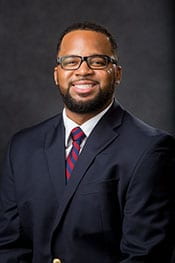
be done even beyond the PC community. Photo courtesy of Providence College.
An Interview with PC Athletic Director Bob Driscoll
by The Cowl Editor on October 16, 2020
Friar Sports
Driscoll Speaks on the Pandemic’s Long-Lasting Ramifications
by Cam Smith ’21
Sports Co-Editor
Last October, The Cowl sat down with vice president and director of athletics, Bob Driscoll, in his office on the top floor of the Friar Development Center. The conversation revolved around the remarkable success of Providence College athletics in recent years, as well as the growth of the campus and its stunning athletic facilities.
This October, that conversation looked vastly different. In place of an in-person meeting was an all-too-familiar Zoom call. The topics of discussion were different, too. There was no Late Night Madness to reflect on, nor was there a fall sports season to review. Instead, the interview was filled with thoughts on what could have been as well as speculation on what hopefully can be.
That being said, even without an ongoing sports season to discuss, there remained plenty to talk about. One might think an athletic director without sports may have some free time on their hands. However, Driscoll certainly does not, as his days without sports have been almost as busy as his days with them.
Indeed, much like the rest of the world, the state of PC athletics changed forever in mid-March. Driscoll and the men’s basketball team were in New York City, getting ready to play in the highly anticipated Big East tournament. The first game of the day had already kicked off, with the Friars due up next to take on Butler University. Then, the news they were dreading came.
“It felt surreal. I was just so excited to be down there,” said Driscoll. “I knew it was kind of fragile, but I actually thought we were going to play. We were on Zoom with the presidents and the ADs, with the head people, the doctors from the NCAA just the day before, and they’re going ‘no we’re good, everything is a go.’”
Soon, it became apparent that all spring sports athletics would have to be canceled as well. It was left to Driscoll and the athletic staff to deliver the heartbreaking news. “I remember telling our student-athletes, first of all apologizing to the spring sports and telling them how heartbroken I was that their season got taken away,” recalled Driscoll. “Particularly the seniors, who never got a chance to finish it. But I never thought that we’d be sitting here today not playing sports in the fall. Never.”
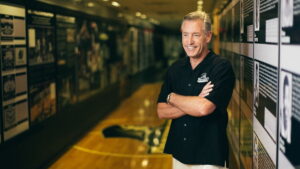
Driscoll had to make another set of calls once it became clear in the summer that fall sports would have to be canceled too. It was not any easier the second time around. “That was difficult because I knew they were heartbroken—as was I,” said Driscoll. “But one thing I said to them was that Friartown, we as a team, are built for this. Mental toughness, grit, resilience—let’s use this as a way of developing our character.”
The athletic department has certainly shown resilience as a whole since those fateful March days. Driscoll credits a strong working relationship between him, the coaches, and the entire athletics staff as the reason for their success in overcoming a myriad of obstacles in recent months. Communication too, says Driscoll, is key.
“I feel as connected as I’ve ever felt to my staff. Although I’m not seeing them in person, I’m seeing them literally everyday through Zoom,” he reflected. “I call, I text, I’ve engaged with them consistently during this entire time frame. And more than just X’s and O’s, [I ask] how’s your family? How’s your children? How are you coping? How’s your health? Really focusing on the higher, more important things and trying to put it into context. Competition is important, but do you know what’s more important? Your health and mental well-being.”
Although Driscoll and the rest of the athletics staff have made the best of a difficult situation, that is not to say that everything is perfect. Recruiting new athletes has been particularly difficult during these times. The NCAA instituted a ban on in-person recruiting since the start of the pandemic, which barred prospective student-athletes from visiting campuses.
For PC, the ban seems to hit especially hard. For many prospective athletes, it is the visit to campus that really sells them on Friartown. “When they walk on the campus and are able to feel the vibe between people, and then you see our beautiful facilities and academic buildings…I think people’s perceptions change pretty radically once we get people here, so I think that’s hurt us a little bit,” lamented Driscoll. “But with people like coach Cooley, Nate Leaman, and Chris Gabrielli, people who are really good at communication…I still think we’ve been able to sign some talented people.”
Some of those recruits will be able to take the court and the rink this winter, as PC plans on going ahead with both its hockey and basketball seasons. With an established testing infrastructure now in place and the appropriate alterations being made to the schedules, Friar fans can plan on watching PC athletics for the first time since March.
“We’re looking at Nov. 20 for the start date for hockey. They’re planning on 24 games right now,” said Driscoll. “[For men’s basketball] we’re still contemplating during winter break, from Dec. 30 until late January, maybe a possible bubble at Mohegan Sun and/or Omaha. We’ve even talked about Disney, where the NBA teams have played, to play five or six games.”
Men’s basketball will join the women’s basketball team in hosting their home games at Alumni Hall. The men’s team usually hosts their games in downtown Providence at the Dunkin’ Donuts Center. Games will be at Alumni for the duration of the season, according to Driscoll, “unless in the new year the state opens up the Dunk and they allow people to come in. Then we’ll make a decision on whether we can get enough people down there to make it worth our while to actually rent the building.”
The resumption of sports this winter will certainly be a welcome sight for a campus that has gone without athletics for seven months. Sports and the comradery that they bring is a key part of the culture at PC. Without them, campus has certainly felt far less alive.
“Yeah, it just feels empty,” said Driscoll. “I was talking to my wife the other day, this is my 46th year in college athletics…and I’ve never experienced anything like this; it’s like taking a piece of your entire being away for me personally. I can imagine it’s the same for every student that plays and a lot of the fans. These are really unusual and difficult times because I think we as a culture need to be together in groups to celebrate the good things or the struggles. There’s something about being in a sold-out arena that is so inspiring and uplifting. I think it adds to the quality of our lives, win or lose.”
Besides a pandemic, 2020 has also featured one of the largest civil rights movements since the 1960s. Black Lives Matter protests have brought the systemic inequality in our nation to the forefront of the national dialogue. Driscoll is outspoken on the change that must occur in the U.S., just as is he outspoken on the change that must be enacted on the PC campus.
Three years ago, Driscoll sat down with the women’s basketball coaching staff. He recalls them “hitting him in between the eyes” about how the athletics department and school in general was not doing the best it could do for its BIPOC students and staff. “They shared stories that were very disturbing to me, about how our young men and women of color were treated,” disclosed Driscoll. “It opened my eyes to what we needed to try to do if we were going to be a leader in this world, and one of those things was that we needed to hire more men and women of color.”
The department carried out this vision, hiring top-notch candidates such as Nick Sailor, the director of training and education for Diversity, Equity and Inclusion. In their five-year strategic plan, they also have guidelines in place “almost like the Rooney Rule in the NFL,” said Driscoll. “Where that in every position we hire for we are going to consciously turn over every stone to try and find men and women of color, from diverse backgrounds, to make our organization better.”
Driscoll also spoke to the efforts of Ivan Thomas, an assistant coach on the men’s basketball staff. Thomas is among the founding members of Coaches for Action, a coalition of all 21 Black men’s basketball assistant coaches in the Big East. “I was able to bring Ivan and the other coaches in front of the ADs of the Big East and they made an amazing presentation,” stated Driscoll. “They proposed that we wear Black Lives Matter patches on our jerseys, and also spoke about really focusing on getting the [student-athlete] vote out, and then raising some money for first-generation students of color scholarships.”
The proposal was universally passed. “I’m really proud and happy about that,” said Driscoll. “But we still have a long way to go.”
To conclude, Driscoll spoke on the recent events surrounding campus, emphasizing the importance of the safety protocols while also sympathizing with the students who have felt the impact of the recent lockdown. “I just wanted to thank all of our students for their hard work,” said Driscoll. “This is not easy work and a lot of times young people get the blame for this stuff, and it’s really not their fault. This is an epidemic that affects us all. So, my message is really just: stay strong, stay together, this will pass, and we’ll be back watching games hopefully in the very near future.”
Friar fans certainly hope all goes according to plan, as the arrival of basketball and hockey will be a major boost to a campus that has seen most of its events shut down. For Driscoll and the entire athletics department, their arrival will be a marker of months of hard work paying off.
And for Driscoll, it will probably provide some sense of normalcy for the first time since that fateful March bus ride to New York City.
Working Towards PC Equality: IDEI Department Establishes Student Representative Groups
by The Cowl Editor on December 5, 2019
Campus
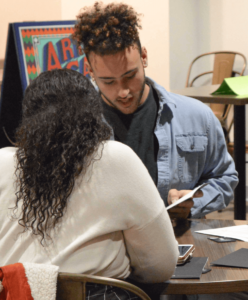
by Hannah Langley ’21
News Co-Editor
For several years now, Providence College administration, students, and faculty have been working towards creating a PC200 plan that includes many initiatives, such as the promotion of more diversity and inclusion on campus. Recently, the office of Institutional Diversity, Equity and Inclusion (IDEI) at PC has established two student groups to help the College fulfill this goal.
These two groups, the Advocates of a Beloved Community (ABC) and the Student Diversity Advisory Council (SDAC), are both comprised of around a dozen students, each representing a different student organization or club on campus.
According to a formal document from Quincy Bevely, assistant vice president of institutional diversity, the “Advocates” and council members “will be trained in areas related to cross-cultural understanding, micro-macro aggressions, restorative practices, and conflict resolution.”
Furthermore, ABC will provide the PC community with events that will promote further awareness about bias and hate, giving students, faculty, and staff the opportunity to, according to the same document, “engage in anti-bias education, advocacy, and solidarity.”
As previously mentioned, multiple students were chosen for each of the groups, representing various PC clubs and organizations, including Student Congress, Board of Programmers (BOP), Friars Club, Board of Multicultural Student Affairs (BMSA), Organization of Latin American Students (OLAS), Stopping Homophobia, Eliminating Prejudice and Restoring Dignity (SHEPARD), Campus Ministry, Orientation Leaders (OL), Residence Assistants (RA), Peer Mentoring Program (PMP), Horizons, Providence Immigration Rights Coalition (PIRC), Brotherhood, NAACP, ALPHA, ESports, The Cowl, and Believers of Word (BOW).
Jacqueline Peterson, special advisor to the president, talked about her role in the IDEI department and her part in creating these groups. “The priority goal,” she said, “has been to implement a structure and collaborative partnerships on campus to identify the strategic direction for the College’s DEI initiative.” Her role in this is to provide leadership to not only the student groups, but also to the educators and faculty in the IDEI department.
The purpose of SDAC, Peterson said, is to “empower students to lead and promote a campus environment that is committed to equity, social justice, and inclusive excellence.” ABC’s role is to “develop appropriate educational, supportive, and restorative strategies to address campus climate issues that may arise in the wake of bias-related incidents and prevent further occurrences.”
Along with Bevely and Peterson, Nick Sailor ’17, the director of training and education for IDEI, and Kalan Lewis, a current graduate assistant, have had an integral part in making these two student groups and continuing to work with them and the PC community to promote diversity and inclusion.
Earlier this year, Bevely selected students to represent each of these organizations. Acklynn Byamugisha ’20, advocate for BMSA, talked about the selection, saying, “I was chosen by Quincy [Bevely] and I was more than thrilled to take on the position.” Both Byamugisha and Elizabeth Duffy ’23, advocate for Campus Ministry, talked about how their roles will be in building more respect around campus, creating a greater cultural awareness, and highlighting differences across cultures. Byamugisha talked more about this, saying, “Multiculturalism goes beyond race [and] what the eyes are able to see.”
Duffy is hopeful that the group will be able to cultivate awareness and change on campus, saying, “I feel like there is always room to grow in becoming a close-knit community of friends, and I’m hopeful that this newfound deeper sense of family and love will radiate into the world when students graduate.”
Ricardo Guzman ’20, representative for the SDAC and president of SHEPARD, talked about how their group is also going to promote equality and awareness, saying they plan on having meetings starting next semester to hear more about what various clubs and organizations have planned for promoting diversity and change. “It is one thing to work with the student body,” said Guzman, “but through this group we hope to create institutional change.”
On Nov. 13, both groups met in Moore Hall to begin training with Diane Goodman, who has devoted her life to training, consulting, teaching, speaking, and writing about diversity and social justice. Goodman came to PC’s campus to meet with the students from both of these groups in order to prepare them in their roles and for their lives in the future, as well.
Both groups will be beginning work next semester, and Bevely is excited for what is to come.
Working for Greater Equality On-Campus: College Responds to Call for Greater Inclusion and Diversity
by The Cowl Editor on October 31, 2019
Campus
by Maura Campbell ’22
News Staff
On Monday, October 21, the Providence College student body received an email from Rev. Brian Shanley, O.P., president of the College, informing students, staff, and faculty of an update by the Office of Institutional Diversity, Equity, and Inclusion (IDEI). The email provided general information regarding IDEI’s recent work to promote diversity on campus, and specifically addressed some potential issues previously raised about the elementary and special education department.
In light of recent claims that the Department of Elementary and Special Education has not been an inclusive department and major on campus, IDEI has partnered with the department to help to create a more inclusive environment.
In reference to the ESE department, the email also mentioned Jennifer Swanberg, dean of the school of professional studies, high lightingher work “to develop a cultural transformation process with the goal of ensuring that all ESE faculty and staff are equipped with the evidence-based skills, knowledge, and competencies to foster this type of inclusive environment.”
In particular, the email included a flyer that was distributed at IDEI’s recent meeting, explaining their major initiatives. These initiatives include the Diversity Strategic Directions Steering Committee, a committee to help engage internal leaders in a conversation about diversity and create a clear plan and direction for diversity, and Advocates for Beloved Community (ABC), a team promoting racial justice and reconciliation on campus and addressing Title VI racial bias incidents.
The flyer also detailed IDEI’s five focus areas for 2019-2020. This strategic plan, known as PC200, hopes to promote diversity, equity, and inclusion at PC through these focus areas, “ranging from structural diversity, access, and equity, to student learning and development—and has developed relationships with a diverse team of campus partners to address these areas through educational training, specific programming, departmental counseling, and other initiatives,” Shanley said.
These five focus areas are structural diversity, access, and equity, institutional infrastructure, climate and intergroup relations, formal and informal curricula, and student learning and development.
In addition, the flyer included information about events and programming held at the Center at Moore Hall. This programming includes the Urban Dance Series, classes on diverse dance styles and culture held by Providence-based dancers and educators. Other programming includes Conversations for Change, a set of workshops inspired by Rev. Dr. Martin Luther King Jr., promoting “nonviolence, consensus building, and civic action,” and the World Cinema Series, a PC faculty-hosted program centered around “the film traditions and innovation of different countries throughout the world.”
This email highlights the work of the Office of Institutional Diversity, Equity, and Inclusion in recent and upcoming months. This work to promote diversity and inclusion is “critical to the future success of Providence College,” Shanley said. He further added that “each of us is responsible for communicating and working together to translate this vision into action.”
IDEI’s dedication to promoting diversity and inclusivity at PC an important part of the College’s mission, and this update is relevant to students seeking resources and outlets on these issues. The goal of their work can be summed up in their mission statement: “Rooted in our Catholic and Dominican identity, the Office of Institutional Diversity, Equity, and Inclusion advances Providence College’s commitment to developing purposeful collaborations across all areas of the College and the greater community to foster an environment where people of all backgrounds, cultures, identities and perspectives can flourish.”
The Office of Institutional Diversity, Equity, and Inclusion can be reached at diversity@providence.edu or in their office in Harkins 312.
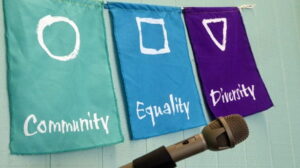
photo courtesy of publicdomainpictures.net
